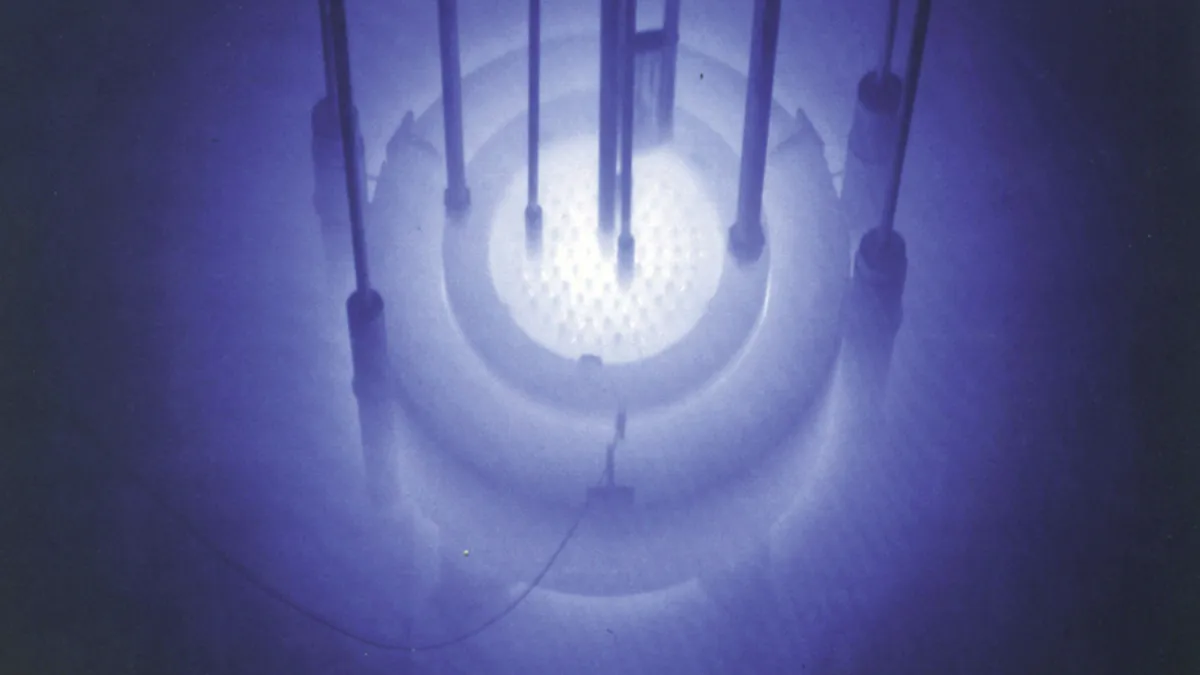Dive Brief:
- The Department of Energy on Thursday launched the Advanced Reactor Demonstration Program, a cost-shared partnership with industry to build two advanced reactors that can be operational within the next five to seven years.
- DOE is providing $160 million in initial funding, part of the $230 million appropriated by Congress for Fiscal 2020 to start an advanced reactor demonstration program. A growing number of traditional baseload nuclear plants have been closing in recent years. Advocates are pushing policy measures to support those, but also see a new generation of reactors as critical to the future of the industry.
- The deadline for submitting proposals under the advanced reactor funding program is Aug. 12.
Dive Insight:
Nuclear power has been under assault by cheaper gas and renewables, a trend that has only been heightened by the impacts of the coronavirus pandemic.
In its latest Short Term Energy Outlook, the U.S. Energy Information Administration projects that electric power sector net generation from nuclear will go from 809.41 billion kWh in 2019 to 799.80 billion kWh in 2020 and 782.39 billion kWh in 2021.
But at the same time, nuclear energy is a significant source of emissions-free generation and industry leaders are touting a new generation of reactors as a critical part of meeting ambitious carbon reduction goals.
"The next generation of nuclear energy is critical to our Nation's energy security and environmental stewardship," U.S. Secretary of Energy Dan Brouillette said in a statement.
"As the recently released Nuclear Fuel Working Group's Strategy to Restore American Nuclear Energy Leadership exemplifies, we must pursue technological innovation and advanced nuclear RD&D investments to strengthen American leadership in the next generation of nuclear technologies, ensuring a healthy and growing U.S. nuclear energy sector," the statement continued.
In addition to supporting the goal of creating a fully functional advanced reactor within 5-7 years, the $160 million in initial funding is also available to support "up to five additional teams resolving technical, operational, and regulatory challenges to prepare for future demonstration opportunities" as well as "innovative and diverse designs with potential to commercialize in the mid-2030s."
According to DOE, the program will leverage the Idaho National Laboratory's National Reactor Innovation Center to test and assess advance reactor design technologies and move them "from blueprints to reality."
The Nuclear Energy Institute (NEI) called the program "a critical step toward making advanced reactors — and the carbon-free future they represent — a reality. "
While DOE is taking steps to make advanced reactors a commercial reality, the Nuclear Regulatory Commission is also conducting its required assessments.
On Tuesday, NRC published a proposal and guidance on an emergency preparedness framework for nuclear facilities with small modular reactors and other new technologies.
The Union of Concerned Scientists along with the director of FEMA's Technological Hazards Division and NRC Commissioner Jeff Baran have criticized that proposal, with Baran calling it "a radical departure from more than 40 years of radiological emergency planning."
Last December, the Tennessee Valley Authority became the first U.S. utility to get permission to potentially build and operate small modular reactors after the NRC authorized the issuance of an Early Site Permit for its Clinch River site.
In addition, NRC is expected to grant the first small modular reactor design certification to NuScale Power later this year and Oklo submitted the first license application to NRC for an advanced reactor earlier this year, for their Aurora micro-reactor, NEI noted.














